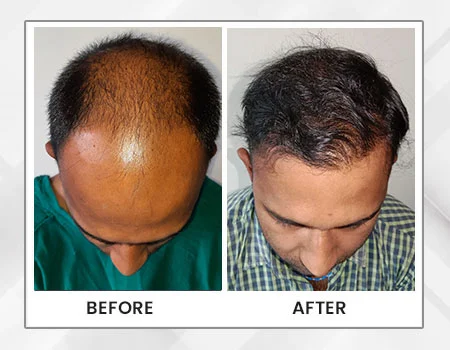Male Hair Loss Treatment From Dr. Paul’s Advanced Hair and Skin Solutions
Book Appointment
- Minoxidil (Rogaine): Minoxidil is an over-the-counter topical medication that is applied directly to the scalp. It is believed to work by increasing blood flow to the hair follicles and prolonging the growth phase of the hair cycle. Minoxidil is available in various strengths and formulations and is typically applied twice daily. It may take several months of consistent use to see results, and hair regrowth may be minimal for some individuals.
- Finasteride (Propecia): Finasteride is an oral medication that is available by prescription only. It works by blocking the conversion of testosterone into dihydrotestosterone (DHT), a hormone that can shrink hair follicles and contribute to hair loss in men with androgenetic alopecia. Finasteride is taken once daily, and it may take several months to see noticeable results. It’s important to note that finasteride can cause side effects in some men, including decreased libido and erectile dysfunction.
- Hair Transplant Surgery: Hair transplant surgery by Male Hair Loss Treatment in Siliguri involves taking hair follicles from areas of the scalp where hair is still growing (the donor site) and transplanting them to areas of the scalp where hair loss has occurred (the recipient site). This procedure can be effective in restoring hair in balding areas and providing natural-looking results. However, it is a surgical procedure that carries risks and may require multiple sessions to achieve desired results.
- Platelet-Rich Plasma (PRP) Therapy: PRP therapy involves extracting a small amount of the patient’s blood, processing it to isolate platelet-rich plasma, and injecting it into the scalp. PRP contains growth factors that may help stimulate hair growth and improve the health of hair follicles. While research on the effectiveness of PRP therapy for male hair loss is ongoing, some studies suggest that it may be a promising treatment option for certain individuals.
- Laser Therapy: Low-level laser therapy (LLLT) involves using devices that emit low-level laser light to the scalp. It is believed to stimulate hair follicles and promote hair growth. Laser therapy can be administered at home using handheld devices or in clinical settings using larger, more powerful devices. While some studies have shown positive results with LLLT for male hair loss, more research is needed to confirm its long-term effectiveness.
- Hair Loss Shampoos and Supplements: There are various shampoos, conditioners, and supplements available that claim to promote hair growth and improve the overall health of the hair and scalp. While these products may contain ingredients such as biotin, vitamins, and botanical extracts that are believed to support hair health, their effectiveness in treating male pattern baldness is often limited.
Why does HAIR FALL happen?
There are many reasons for excess hair fall in Men. Some of the common reasons are:
- Irregular dietary habits Eg. Skipping breakfasts / meals, Crash Dieting
- High intake of refined carbohydrates, saturated fats, preservatives eg. aerated soft drinks, mono-sodium glutamate in chinese foods, deep fried food etc. These deprive the hair of its nutrients.
- Specific nutritional deficiencies Eg. Vitamin D, Vitamin B12, Proteins, Zinc
- Hormonal Influences – teenage, heavy weight training and body building supplements
- Stress
- Dandruff, Scalp infections
- Illnesses, surgery
It’s important to consult with a dermatologist or healthcare professional before starting any treatment for male hair loss. They can assess your individual situation, discuss your treatment options, and help you develop a personalized plan that addresses your needs and concerns. Additionally, it’s essential to have realistic expectations about the results of hair loss treatments, as they may vary from person to person.










